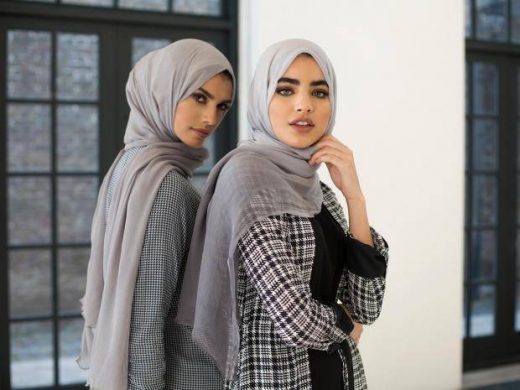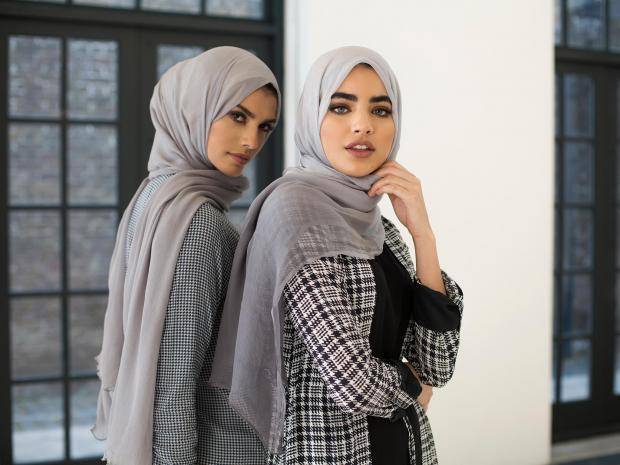How Modest Clothing Brand The Modist Delivers Style Without Sacrifice
April 18, 2018
A native Algerian who grew up in the Middle East, Ghizlan Guenez was working in private equity when she developed the idea for a luxury e-commerce platform devoted to the kind of clothes that she and the women in her family like to wear: high fashion, just with “long sleeves, long hems, no high slits, not too much lace,” she says. But when Guenez began taking the concept of a “modest” fashion site to designers a couple of years ago, she found that many had a very narrow idea of what that meant, envisioning plain fabrics and loose silhouettes. “[They] had a specific woman, religion, and even country in mind,” she says. “We are smashing these stereotypes.”
Last March, on International Women’s Day, Guenez launched the Modist, which showcases everything from floral silk dresses to fitted sequin jumpsuits from more than 100 designers. The site, which has already attracted shoppers in 65 countries, reflects the concerns of a growing group of women who, for reasons both cultural and personal, want full-coverage clothing that doesn’t forgo style. The modest fashion space is predicted to grow into a $484 billion market by 2019, largely spurred on by Muslim shoppers, who are expected to spend $368 billion on apparel by 2021, according to the recent State of the Global Islamic Economy Report from Thomson Reuters.
The fashion industry has taken notice. In February, Macy’s launched the Verona Collection, a ready-to-wear line that includes hijabs, tunics, and layered ensembles. Meanwhile, at the luxury level, houses such as Dolce & Gabbana and Burberry have spent the past couple years getting into the space, offering special abaya collections during Ramadan. The Arab Fashion Council recently expanded its Arab Fashion Week from Dubai to Riyadh, Saudi Arabia. In London, the two-year-old Modest Fashion Week showcases designers from around the world, including emerging labels such as Under-Rapt and 1001 Abayas.
Modest Fashion On The Rise
The Modist, which is one of the first platforms devoted entirely to high-end, full-coverage fashion, follows Net-a-Porter’s model of mixing curated e-commerce with content–including a seasonal print magazine, The Mod–to create a robust online community. (Guenez even hired two Net-a-Porter veterans for her team: chief operating officer Lisa Bridgett and fashion and buying director Sasha Sarokin.) The company distinguishes itself from competitors by showcasing both traditionally modest labels and appropriate styles from mainstream brands, such as Missoni, Oscar de la Renta, and Proenza Schouler. The site calls out important details like fabric thickness or how loosely an item fits, in case shoppers want to layer, and features models of different races and religions, wearing head coverings and not. “The frustration of trying to find something [modest] may be stronger with a woman who has religious reasons,” Guenez says, “but the reality is there’s a much broader consumer base. The Modist wasn’t built for just one type of woman.”
Just over a year after the site’s launch, the company says monthly traffic has been growing by 45%, and Guenez is aiming to triple annual revenue in 2018. (Top markets are the Persian Gulf States, followed by the U.K. and the U.S.) The Modist’s increasing prominence has even inspired designers, including New York’s Adam Lippes, to adjust their clothes to meet its parameters–extending hems, turning sheer features opaque, and sewing up open backs or thigh slits. Lippes says he was initially skeptical that his clothes would qualify as modest fashion, but the site has proven to be an important channel for his independent brand, growing his presence “exponentially” in the Middle East. “It was a risk,” he says, “but boy, was it the right risk to take.”
Guenez continues to add new designers to the site each season. When she senses gaps between what the fashion houses offer and what her customers want, the Modist commissions exclusive collections, such as a Ramadan-themed caftan capsule featuring custom pieces from London-based Mary Katrantzou, among others. Guenez says she’s already seeing evidence of her platform’s broader influence on the fashion community. On a recent trip to the Paris showroom of designer Peter Pilotto, she noted his latest collection needed little editing to fit her site’s specifications. “I told him, ‘It’s almost like it’s for us,’” says Guenez. Pilotto replied that the Modist customer had been on his mood board all along.
(29)



